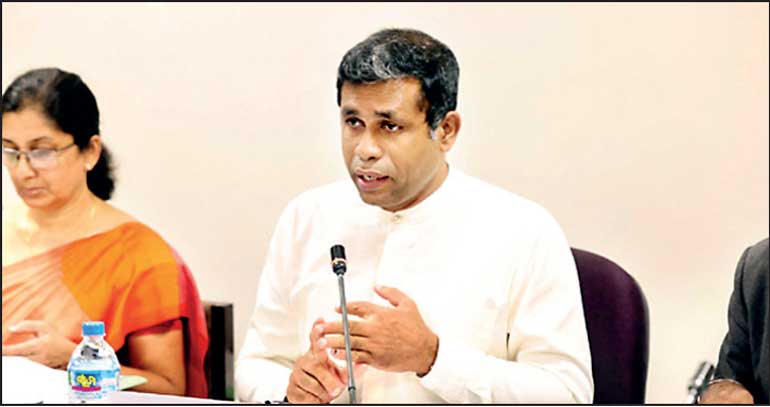-By A Staff Reporter

(Lanka-e-News -14.July.2025, 11.10 PM) A damning recommendation from Sri Lanka’s Committee on Public Enterprises (COPE) has called for the legal restoration of the Sri Lanka Institute of Information Technology (SLIIT) to the administration of the Mahapola Higher Education Scholarship Trust Fund, following revelations of irregular asset transfers and mismanagement.
COPE Chairman Nishantha Samaraweera has formally recommended that the Secretary to the Ministry of Trade, Commerce, Food Security and Cooperatives, Mr. K.A. Vimalenthirarajah, along with the Chairman of the Mahapola Trust Fund, former Supreme Court Justice Vijith Malalgoda, take immediate steps to initiate the necessary legal process.
The recommendation follows an inquiry on July 9th, during which Lalith Athulathmudali Mahapola Scholarship Trust Fund was summoned before COPE to discuss audit reports for 2022 and 2023, as well as its present operational status.
According to COPE, a 2015 Cabinet decision enabled the transfer of Mahapola’s interest in SLIIT to another party with the then-Minister’s knowledge, but without proper legal scrutiny. The move, now regarded as illegal, was debated at length during the session.
One of the most troubling findings was that SLIIT had paid Mahapola Rs. 408 million for what was originally state-owned property. Lawmakers pointed out the absurdity of a Mahapola-owned institution paying the Fund itself to reclaim rights over its own assets. They highlighted this as not only irrational but fundamentally problematic from a governance standpoint.
Chairman Samaraweera emphasised that those involved in the illegality must be held accountable, and that such corrupt practices must be prevented through firm legal action. “We cannot allow such theft to become normalised,” he said during the proceedings.
The newly appointed Minister of Trade, Vasantha Samarasinghe, who serves as the statutory representative of the Fund, also addressed the Committee. He assured Parliament that these malpractices will not be swept under the carpet and that comprehensive investigations will follow.
SLIIT, which began as a respected public-private initiative under Mahapola oversight, has now become a lucrative operation yielding significant profits—prompting what one official described as “greedy manoeuvring” to sever it from government control. A former official who opposed the original asset transfer told COPE that SLIIT was deliberately removed from state ownership due to its growing profitability.
Concerns were also raised during the proceedings that certain vested interests may attempt to sabotage the inquiry by claiming that SLIIT’s reputation as a university educating thousands of students might suffer. However, the COPE committee was adamant that the solution lies not in dismantling SLIIT but in restoring the Mahapola Trust’s rightful stewardship.
The committee strongly advocated for SLIIT to remain operational in its current educational format, but with governance reverting to Mahapola. This would ensure that degree programs could continue at affordable rates, benefiting a broader segment of Sri Lankan students.
Further criticism was levelled at the former administration for failing to properly fill key vacancies within the Mahapola Trust, including internal auditors and other essential positions. The lack of a complete and capable staff at an institution managing billions of rupees was described by COPE as a “serious threat to operational integrity.”
COPE also reviewed the state of other Mahapola-administered entities, including National Wealth Corporation Ltd and its subsidiary, NatWealth Securities. These companies have reportedly incurred losses, prompting fresh investment from Mahapola to keep them afloat. COPE expressed concern over such reinvestments and called for a forensic audit into these ventures before any further decisions are taken.
COPE further stressed that Mahapola must expand its scholarship programme to reach a greater number of deserving students, particularly in light of its strong financial position. The Fund currently holds capital of approximately Rs. 20 billion, from which it earns significant interest and income.
Chairman Malalgoda assured the committee that the Trust is committed to managing its capital prudently while ensuring that scholarships are awarded transparently and equitably.
This latest probe into Mahapola and SLIIT underscores the persistent failures in public asset management that have plagued successive governments. What began as an education initiative to uplift underprivileged youth is now entangled in allegations of exploitation, institutional neglect, and opaque transactions.
Whether the current administration will possess the political will to rectify the legal status of SLIIT and restore public trust in Mahapola remains to be seen. But for now, COPE’s message is clear: accountability must be pursued, governance restored, and public institutions protected from privatisation by stealth.
-By A Staff Reporter
---------------------------
by (2025-07-14 18:02:52)
Leave a Reply